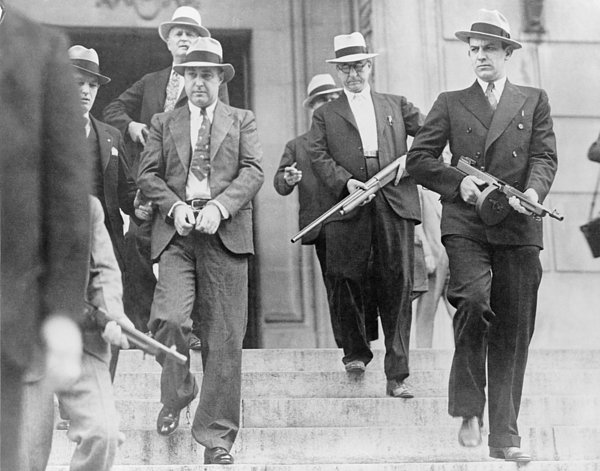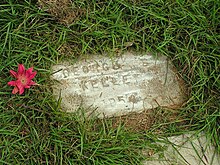| George Celino Barnes | |
|---|---|
 Mugshot of George "Machine Gun Kelly" Barnes | |
| Born | July 18, 1895 Memphis, Tennessee, U.S. |
| Died | July 18, 1954 (aged 59) Leavenworth Federal Penitentiary,Leavenworth, Kansas, U.S. |
| Charge(s) | Conspiracy to kidnap and bank robbing |
| Occupation | Gangster, bootlegger, and businessman |
| Spouse | Kathryn Kelly |
George Celino Barnes (July 18, 1895 – July 18, 1954), better known as"Machine Gun Kelly", was an American gangster during the Prohibitionera.[1][2][3] His nickname came from his favorite weapon, a Thompson submachine gun. His most famous crime was the kidnapping of oil tycoon and businessman Charles F. Urschel in July 1933 for which he, and his gang, collected a $200,000 ransom. Their victim had collected and left considerable evidence that assisted the subsequent FBI investigation that eventually led to Kelly's arrest in Memphis, Tennessee on September 26, 1933.[3] His crimes also included bootlegging and armed robbery.
[edit]
During the Prohibition era of the 1920s and 1930s Kelly worked as a bootlegger for himself as well as a colleague.[1] After a short time, and several run-ins with the local Memphis police, he decided to leave town and head west with his girlfriend. To protect his family and escape law enforcement officers, he changed his name to George R. Kelly.[4] He continued to commit smaller crimes and bootlegging. He was arrested in Tulsa, Oklahoma, for smuggling liquor onto an Indian Reservation in 1928 and sentenced for three years toLeavenworth Penitentiary, Kansas, beginning February 11, 1928. He was reportedly a model inmate and was released early. Shortly thereafter, Kelly married Kathryn Thorne, who purchased Kelly’s first machine gun and went to great lengths to familiarize his name in the underground crime circles; she also helped plot some small bank robberies.[citation needed]Career
Nonetheless, Kelly’s last criminal activity proved disastrous when he kidnapped a wealthy Oklahoma City resident, Charles F. Urschel and his friend Walter R. Jarrett. Urschel, having been blindfolded, made note of evidence of his experience including remembering background sounds, counting footsteps and leaving fingerprints on surfaces in reach. This proved invaluable for the FBI in their investigation, as they concluded that Urschel had been held in Paradise, Texas, based on sounds that Urschel remembered hearing while he was being held hostage.
An investigation conducted at Memphis disclosed that the Kellys were living at the residence of J.C. Tichenor. Special agents from Birmingham, Alabama were immediately dispatched to Memphis, where, in the early morning hours of September 26, 1933, a raid was conducted. George and Kathryn Kelly were taken into custody by FBI agents and Memphis police. Caught without a weapon, George Kelly allegedly cried, "Don't shoot, G-Men! Don't shoot, G-Men!" as he surrendered to FBI agents. The term, which had applied to all federal investigators, became synonymous with FBI agents. The couple was immediately removed to Oklahoma City.
The arrest of the Kellys was overshadowed by the escape of ten inmates, including all of the members of the future Dillinger gang, from the penitentiary in Michigan City, Indiana that same night.
On October 12, 1933, George and Kathryn Kelly were convicted and sentenced to life imprisonment. The trial was held at the Post Office, Courthouse and Federal Office Building in Oklahoma City.
Investigation at Coleman, Texas disclosed that the Kellys had been housed and protected by Cassey Earl Coleman and Will Casey and that Coleman had assisted George Kelly in storing $73,250 of the Urschel ransom money on his ranch. This money was located by Bureau agents in the early morning hours of September 27 in a cotton patch on Coleman's ranch. They were both indicted at Dallas, Texas on October 4, 1933, charged with harboring a fugitive and conspiracy, and on October 17, 1933, Coleman, after entering a plea of guilty, was sentenced to serve one year and one day, and Casey after trial and conviction, was sentenced to serve two years in the United States Penitentiary at Leavenworth, Kansas.[5]
The kidnapping of Urschel and the two trials that resulted were historic in several ways. They were: 1) the first federal criminal trials in the United States in which moving cameras were allowed to film; 2) the first kidnapping trials after the passage of the so-calledLindbergh Law, which made kidnapping a federal crime; 3) the first major case solved by J. Edgar Hoover’s FBI 4) the first prosecution in which defendants were transported by airplane.
[edit]Death
Machine Gun Kelly spent his remaining 21 years in prison. During his time at Alcatraz he got the nickname "Pop Gun Kelly". This was in reference, according to a former prisoner, to the fact that Kelly was a model prisoner and was nowhere near the tough, brutal gangster his wife made him out to be. He spent 17 years on Alcatraz, working in the prison industries, and boasting of and exaggerating his past escapades to other inmates, and was quietly transferred back to Leavenworth in 1951. He died of a heart attack at Leavenworth on July 18, 1954, his 59th birthday, and is buried at Cottondale Texas Cemetery with a small headstone marked "George B. Kelly 1954".[6]
[edit]In popular culture
[edit]Film and television
- Machine Gun Kelly and his crimes were (loosely) portrayed in the 1958 film Machine-Gun Kelly starring Charles Bronson.
- Machine Gun Kelly is portrayed by Richard Eschliman in a minor role, in the 1973 film Dillinger.
- Machine Gun Kelly is a central character in the 1974 TV film Melvin Purvis: G-Man.
- Machine Gun Kelly is referenced in the 1993 film So I Married an Axe Murderer by Phil Hartman's character while touring Alcatraz.
- Machine Gun Kelly is referenced in the 1973 film The Sting by Luther Coleman's son as his mother pulls him away from a radio telecast chronicling his arrest.
[edit]Literature
- Crime novelist Ace Atkins' 2010 book Infamous is based on the Urschel kidnapping and subsequent multi-state misadventures of George and Kathryn Kelly as they attempted to flee both the FBI and other gangsters eager to claim the Urschel ransom money.
- Kelly is (along with Pretty Boy Floyd and Baby Face Nelson) one of the main characters of the comic book series Pretty, Baby, Machine.
[edit]Music
- Machine Gun Kelly and Kathryn Kelly were the inspiration for "Machine Gun Kelly" (1970), a song written by Danny "Kootch" Kortchmar and recorded by James Taylor on his 1971 album Mud Slide Slim and the Blue Horizon.
- Punk band the Angelic Upstarts released a single in 1984 titled "Machine Gun Kelly".
- In the song "M.V.P." by the late Harlem rapper Big L, he says: "I run up like Machine Gun Kelly, with a black skully, put one in your belly, leave you smelly, then take your Pelle Pelle."
- In the song "Bluesman" by Harry Chapin, there's a line: "No! A fool plays the blues like Machine Gun Kelly, Five hundred notes to the bar...".
- Female Rapper Foxy Brown refers to Machine Gun Kelly in her song "Massacre".
- Mentioned in These Animal Men's "I'm Not Your Babylon": "Machine Gun Kelly was the first to crack".
- American rapper MGK gets his stage name from Machine Gun Kelly.
- In the William S. Burroughs' work entitled, "Where he was going," William Burroughs narrates, "It's an instrument," Machine Gun Kelly said, "Play it."



No comments:
Post a Comment